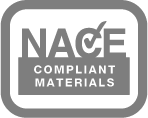Foothill Ranch, CA – March 31, 2016 – Bal Seal Engineering, Inc., a leading producer of custom-engineered conducting solutions for equipment used in high-current applications, has subjected its Bal Spring™ canted coil springs to third-party testing to demonstrate how well the springs withstand KEMA’s rigorous short circuit current exposure and cycling. The results will enable the company to provide customers with verified performance data, including continuous, short-circuit and peak current ratings and electrical resistance per spring coil.
 Short circuit current testing of springs made from two highly conductive copper alloy materials was conducted at 1 second and 3 seconds at power levels up to 65,000 amps to determine the average maximum current each material could withstand. An additional test was also conducted to demonstrate the number of cycles a single spring could withstand when a short circuit current of 3 seconds is applied repeatedly.
Short circuit current testing of springs made from two highly conductive copper alloy materials was conducted at 1 second and 3 seconds at power levels up to 65,000 amps to determine the average maximum current each material could withstand. An additional test was also conducted to demonstrate the number of cycles a single spring could withstand when a short circuit current of 3 seconds is applied repeatedly.
Jim Harty, Bal Seal Engineering’s global market manager for energy, says the third-party testing validates the company’s internal testing and highlights the spring’s ability to endure the harsh conditions found in high-current power transmission and distribution applications.
“Our springs are already at work in some of the world’s most demanding high-current applications,” says Harty. “But the test results give us an unbiased, accurate means to represent their performance. More importantly, they provide our customers with an added level of confidence that the springs we engineer with these alloys will meet their toughest requirements.”
Tests were conducted at KEMA’s Powertest Laboratory (Chalfont, PA) using a fabricated device designed to replicate standard groove and spring design configurations commonly used in high-current applications such as gas-insulated switchgear. Each device included a housing, a piston, a spring, and an insulator ring.
The test springs were installed in a housing-mounted configuration using grease to simulate actual customer usage. Both the piston and housing were made of copper (UNS C11000) and plated with 10–15 μm of silver with a PEEK insulator ring to prevent an undesired short between the pin and the housing.
The tested springs were made of highly conductive copper alloys and silver plated. According to Harty, increasing plating thickness is recommended if a high amount of short circuit current cycles are required.
“Knowing how the springs performed in the tests,” says Harty, “allows engineers to better predict real-world performance and the life of their electrical contact elements.”
About Bal Seal Engineering, Inc.
Bal Seal Engineering, Inc. is a global provider of custom-engineered sealing, connecting, conducting and EMI shielding solutions for industry worldwide. The company’s products employ unique Bal Spring™ canted coil spring technology for enhanced equipment performance and reliability. For information about Bal Seal products and services, visit www.balseal.com, e-mail sales@balseal.com, or call 949-460-2100.









